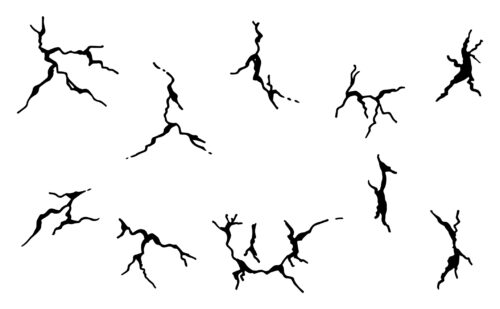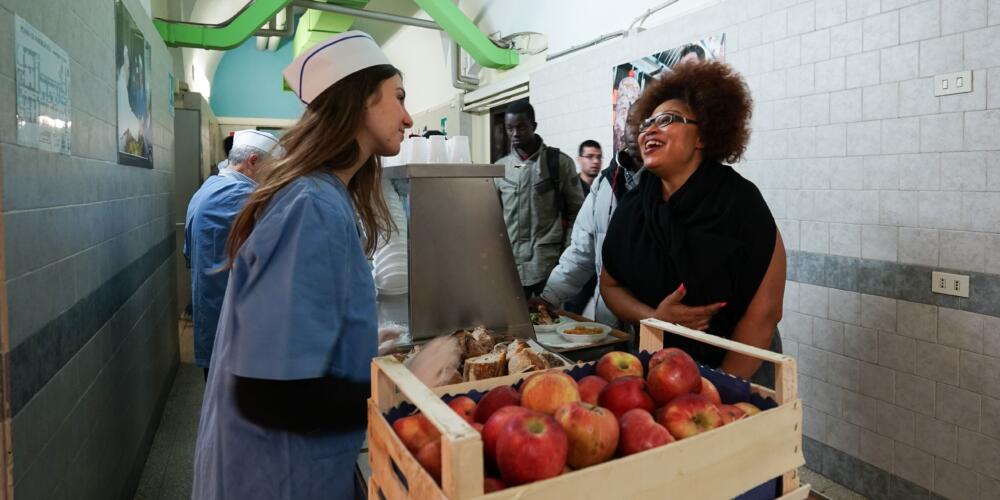
Project of the Month: FOOD2GATHER
By Alison MacDermott
Posted: 18 March, 2022
HERA is pleased to present the next Project of the Month: FOOD2GATHER.
The FOOD2GATHER research project considers the role food plays in creating public spaces and opportunities for people to meet and live together in six European countries, Norway, Germany, France, Italy, The Netherlands and Belgium.
Project Name
FOOD2GATHER: Exploring foodscapes as public spaces for integration
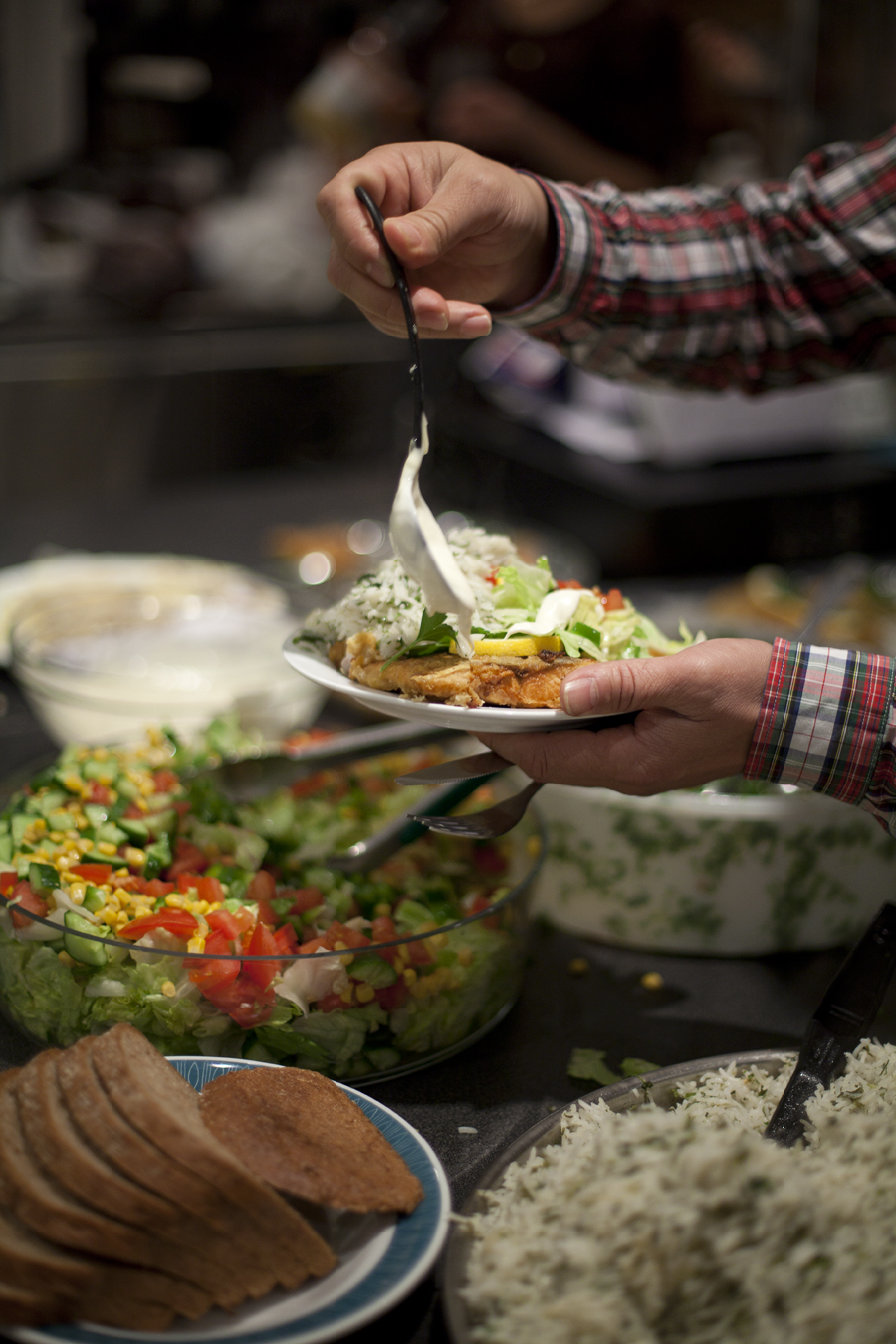
Project Team
- Norway: Coordinator
Virginie Amilien (Principal Investigator), Oslo Metropolitan University, SIFO
Gun Roos (Senior Researcher), Oslo Metropolitan University, SIFO
Helene Fiane Teigen (PhD Scholar), Oslo Metropolitan University, SIFO
Ida Tolgensbakk (Senior Researcher), Oslo Metropolitan University, SIFO
Laura Terragni (Associate Professor), Oslo Metropolitan University, SIFO
Marie Louise Seeberg (Research Professor), Oslo Metropolitan University, SIFO
Clara REICH (PhD Scholar), Oslo Metropolitan University, SIFO
- Germany:
Raùl Matta (Principal Investigator), Georg-August-Universität Göttingen, Institut für Kulturanthropologie/Europäische Ethnologie, GAUG
Edda Starck (Master’s Student), Georg-August-Universität Göttingen, Institut für Kulturanthropologie/Europäische Ethnologie, GAUG
- France:
Chantal Crenn (Principal Investigator), Université Paul Valéry Montpellier 3, UMR SENS
Isabelle Techoueyres (Researcher), Université Bordeaux Montaigne, UMR Passages
Sarah Marchiset (PhD Scholar), Université Paul Valéry Montpellier 3, UMR SENS
- Italy :
Donatella Schmidt (Principal Investigator), Università degli Studi di Padova, DISSGeA, UNIPD
Giovanna Palutan (Postdoctoral Student), Università degli Studi di Padova, DISSGeA, UNIPD
Alice Brombin (Research Member), Università degli Studi di Padova, DISSGeA, UNIPD
Caterina Zanatta Pivato (Research Member), Università degli Studi di Padova, DISSGeA, UNIPD
Eloisa Pantano (Master’s Student), Università degli Studi di Padova, DISSGeA, UNIPD
Tommaso Guerrazzi (Master’s Student), Università degli Studi di Padova, DISSGeA, UNIPD
Leyla Khalil (Master’s Student) Università degli Studi di Padova, DISSGeA, UNIPD
Gholam Najafi (Research Member) Università degli Studi di Padova, DISSGeA, UNIPD
- The Netherlands:
Rick DOLPHIJN (Principal Investigator), Utrecht University, Media and Culture Studies, UiU
Nick POLSON (PhD Scholar), Utrecht University, Media and Culture Studies, UiU
- Belgium:
Elodie Razy (Principal Investigator), FaSS-IRSS, LASC, ULiège
Mélanie Vivier (PhD Scholar), FaSS-IRSS, LASC, ULiège
Describe your project development to date
FOOD2GATHER aims to create cooperation between researchers and partners of the civil society who are involved in dynamic work (on a volunteer or activist basis) that links, in multiple ways, food, migration and the public space. We started by defining “food” through the concept of foodscapes, that is all the contexts in which food, seen in its socio-cultural, economic, political and symbolic dimensions, come into play. By using theoretical concepts and empirical research, each team, composed of researchers with different disciplinary backgrounds – anthropology, sociology, nutrition, history, philosophy, video making – gained a better understanding of how migrants and refugees position themselves in the public space. Using food as an entry point we study the role food can play in the daily lives of our interlocutors, being locals or migrants. Food can be a means to share, to include, to discover, but also to exclude, to differentiate, to construct or to reinvent solidarities. Our research considers how food translates ideologies, is embedded in political, economic, social, but also environmental issues, reflects power relations and hierarchies.
Each team collaborated actively with local partners on the project, through an intense process of knowledge exchange between academia and civil society. Indeed, the main goal of the project consists of negotiating and weaving theoretical reflections with the fieldwork data. This was conducted through a continual and productive dialogue with our associate partners and other collaborators we met during our fieldwork. The hybrid forums, meetings, pilot programmes and other numerous deliverables are a testament and the direct result of this fertile cooperation.
Furthermore, the plurality of our work is expressed by the diversity in disciplinary orientations and the localities in which we are doing research, but also by the diversity of our partners: food businesses and restaurants managed by people in migration situations or where people in migration situations work; asylum-seeker centre; school; social entrepreneurs; municipality run health and food education project directed to migrants; association of asylum seekers; grassroots hospitality associations; diverse food aid initiatives; association supporting local quality food access; municipal resource centre; collective of activists managing squats. In the field, each team uses different methods combining participant observation, visual ethnography, interviews and document analysis etc.
How did the pandemic impact on the project and how has the project adapted?
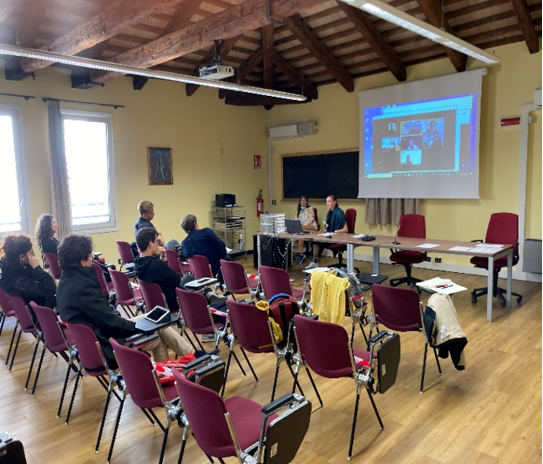
The COVID-19 pandemic had a major impact on FOOD2GATHER activities. The first and the most important effect was on fieldwork activities. Almost all countries had to stop their participant observation during the first months of strict restrictions, while keeping up the contacts with partners. Because fieldwork and collaboration with partners are at the core of our project it was essential for us to maintain links with them. Moreover, local health measures generated changes and delays varying from one country to the other. Flexibility was central as the structure of the research and the planned activities had to be constantly adjusted. For example, our hybrid forums, public dialogic discussions in public spaces gathering various actor, were in some cases “hybrid-hybrid forums” including also digital participation.
However, the pandemic didn’t prevent us from having fruitful and enriching exchanges by organizing digitals meetings and online conferences and workshops. Despite the difficulties, the FOOD2GATHER teams found a way to adjust their research and activities to the situation. Some of us did virtual interviews and others could come back physically to the field after several weeks. In term of ethnographic research, the challenge of the pandemic situation was fruitful and gave us another point of view on the data and theoretical concepts that we are using and analyzing. It changed our perception of public space, food exchanges and the welcoming of migrant’s people in Europe. Sometimes, it highlighted either tensions and discrepancies or exchanges and solidarities, which already existed in fieldworks, but that the pandemic underlined or had transformed. The pandemic situations or consequences are still current and we are still trying to organize pilots and dissemination activities according to the local health measures.
Interesting collaborations / partnerships

- Hybrid Forums:
Each team organised one or two hybrid forums with their partners and local social actors. The aim of these hybrid forums was to bring people together (especially people who normally do not have much chance to meet each other, but we also adjusted hybrid forums to possibilities, restrictions and identified needs of the research/of our partners) and to create an opportunity for them to talk, discuss, and exchange information, know-how and knowledge around a topic we chose in collaboration with partners. Very different subjects have been deliberated such as children’s freedom of speech about food at school and in a reception centre; migration, food precariousness and food aid; food waste and surplus food.
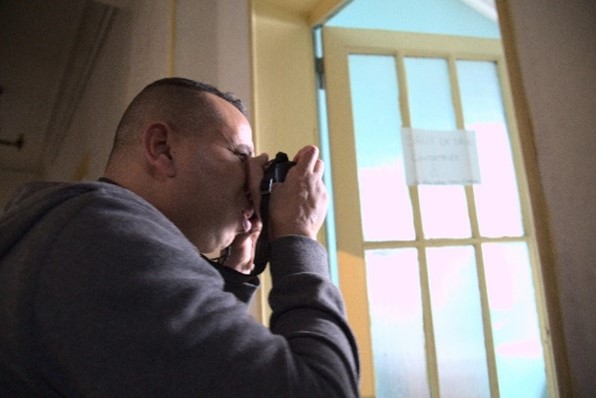
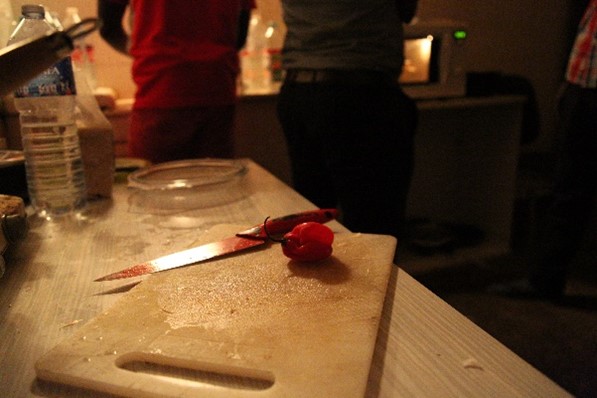
- Photo exhibition and dialogues: Insights from two partners
In a squat of Bordeaux where people in a migration situation used to live (minors waiting to be recognised as such and men, mostly from Africa), the French team collaborated with a photographer. Together with the inhabitants, we took photos which opened towards another view of parts of their daily life. This experience of sensitive methodology allows to reverse the majority perception of what could be “hospitality”, as our interlocuters provided us hospitality in their temporary “home”, mostly around food. Through this experience, we shared some every day practices and adjustments about how they manage to live, to meet, to eat, to sleep, within the constraint frame of migration policies, as they are in waiting situation. Waiting for a better future, with recognition, possibility of working legally, of living in a proper home, and of eating without depending on the food aid network. After the photo workshops, we organised a public event with an exhibition and debate around the notion of “welcoming”.
[See the coming virtual photo exhibition on the FOOD2GATHER blog – linked below in Project Outputs]
In Rome, the associate partner, Astalli Centre, an association devoted to refugees and asylum seekers, fostered contact with privileged migrant women involved in food processing and in radio programs. The in-depth interviews were able to provide us with the gender gaze that had so far received less consideration in the project. In Padova, the pilot project was the result of the active engagement of researchers and partners who have been working hard to gain trust in each other: the result was a photographic exhibition displayed in the plateatic part of the restaurant to be seen by customers, passersby and students of the University close by.
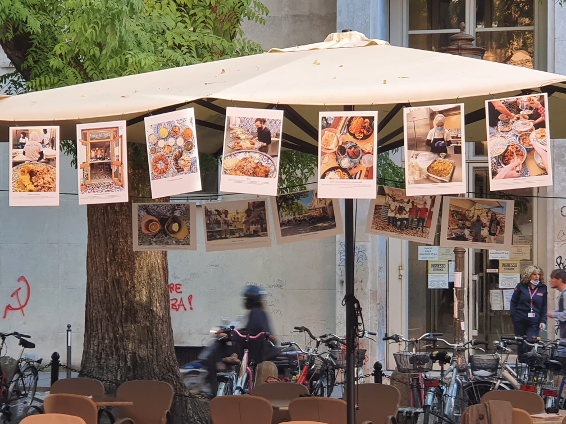
- Workshop around food and anthropology at school:
Over six months, Elodie Razy and Melanie Vivier (the Belgian FOOD2GATHER team), did workshops promoting the social and cultural food perspective, with around one hundred pupils frpm primary and nursery schools. As a result of the workshops, pupils, in collaboration with the teachers and researchers, created a virtual food encyclopedia (soon published: check our blog for information), where we will find children’s points of view and findings around eating habits and food experiences existing around the world and in their own worlds. Below is a photo taken at a workshop at a school where children recreated a food market as they perceived it.
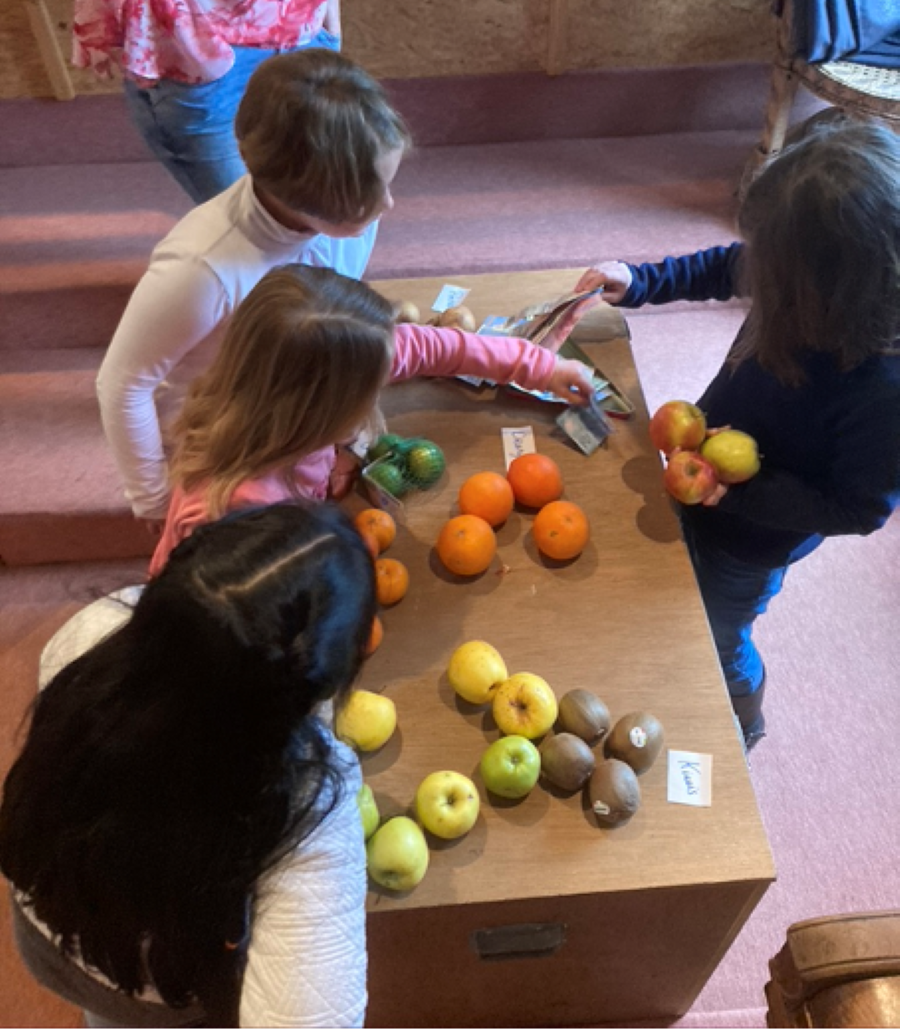
Project Outputs
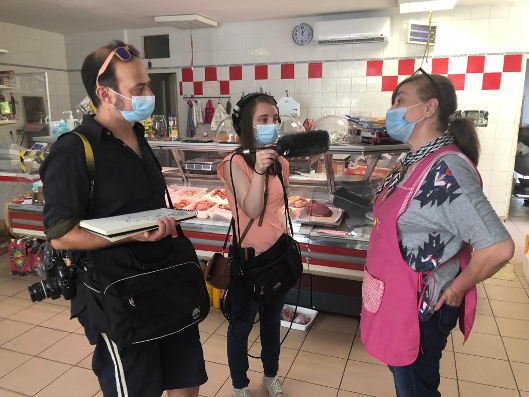
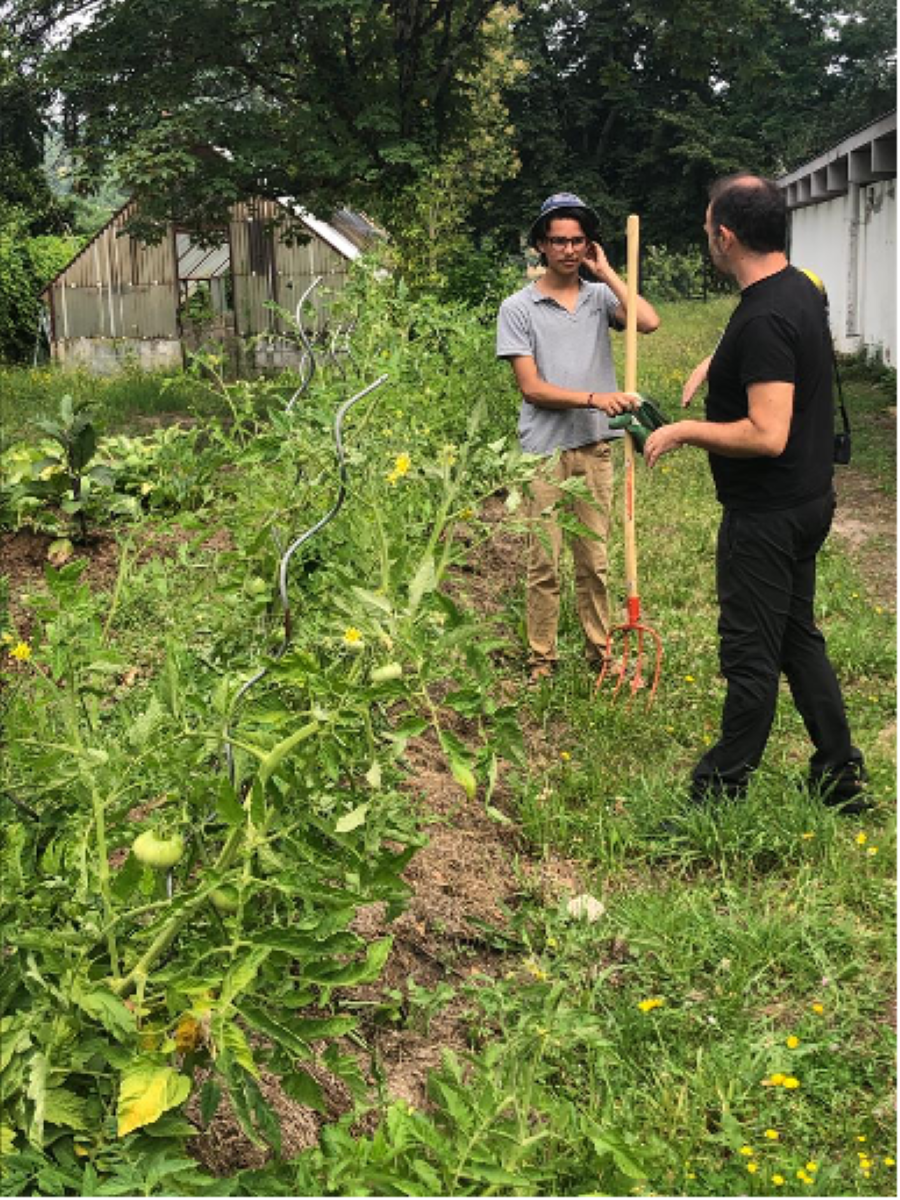
- Production of podcasts:
The end of 2021 was partly dedicated to the production of podcasts. Each team was able to produce two podcasts in collaboration with Jillian O’Mara, a professional in podcast production, with our local partners and local contributors (e.g., a photographer and movie maker for the French team; a lab technician for the Italian team). This popular means of dissemination has created the opportunity for each team to make our research more accessible to a wider audience, while deepening our collaboration and partnership with our interlocutors in the field. Available at: https://www.buzzsprout.com/1918365
- Glossary: a major outcome of extensive field research and new friendships set up during our research project
We will produce a book-length glossary that offers an original, timely and urgent contribution to the study of food and migration in the 21st century. Starting from the impact of migration on contemporary Europe, and from the political treatment of migration and its repercussions on people in migration situations and on society, this Glossary aims to map the concepts that capture changing food practices, and more broadly, which reflect the daily life of people in exile and of those who are in contact with them. Written by social science and humanities scholars, as well as activists, policy makers, people in migration situations, artists and chefs, each contribution is deeply connected to the changing realities of everyday life. With the editors introduction, titled “The Taste of Home; Negotiating Practices”, this book, from the outset, moves away from the oppositions that usually guide discussion (such as immigrant versus inhabitant, local versus global, emic versus etic). Instead of emphasizing the differences, the opening text and the Glossary itself proposes to focus on the moments when things come together, on the sharing. The contributions are based on field research and partnerships, creative collaborations and friendships, and aim to dissect the complexity and plurality of food and migration realities that are unfolding before our eyes and with us.
Follow our blog: https://uni.oslomet.no/food2gather/ [the link of the Glossary will appear in the coming months]

Publications
- Matta, Charles-Edouard De Suremain, C. Crenn. Food identities at home and on the move: explorations at the intersection of food, belonging and dwelling. Bloomsbury Academic, 214 p., 2020. https://www.taylorfrancis.com/chapters/edit/10.4324/9781003085430-1/introduction-ra%C3%BAl-matta-charles-%C3%A9douard-de-suremain-chantal-crenn
- Razy, É., Vivier, M. & Terragni, L., et al., « What is migrants’ food all about ? A media discourses analysis through the lens of controversies » (WP2, projet HERA « Food2Gather »). SIFO project note 3, 2021. SIFO-Note 3-2021Food2Gather 2.2.pdf (oslomet.no)
- Donatella Schmidt and Giovanna Palutan, 2021. Thick leisure. Waiting time in a migratory context, in Leisure and Forced Migration, Reframing Critical Analysis of Lives Lived in Asylum, ed by Nicola De Martini Ugolotti and Jayne Caudwell, Routledge, London
- Giovanna Palutan and Donatella Schmidt, 2021. Slow mobility. Processes of place-making among refugees eating and living at the Tiburtina station in Rome, in Changing Mobilities, ed by Lucio Biasiori, Federico Mazzini, Chiara Rabbiosi, Routledge, London

